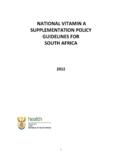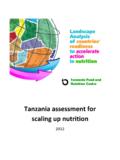Transcription of INTEGRATED MANAGEMENT OF PREGNANCY AND …
1 For Maternal and Neonatal CareStandards INTEGRATED MANAGEMENT OF PREGNANCY AND CHILDBIRTH (IMPAC)Requirements A national policy and locally adapted guidelines on iron and folate supplementation arein place and are correctly implemented. Health care providers of maternal and neonatal care are competent in: the importance ofiron supplementation during PREGNANCY and the postpartum period; the correct dosageand duration of supplementation for the prevention and treatment of anaemia; anaemiadetection in pregnant women; and when to refer women for further diagnosis andtreatment.
2 Iron and folate supplements are available at all levels of care. There is a functioning referral system that ensures timely referral of pregnant womenfor monitoring and treatment, especially in the case of severe anaemia. A mechanism is in place for recording cases and care of anaemia. Health education activities are carried out to increase awareness among women and inthe community of the importance of iron and folate supplementation in and folate supplementationAll pregnant women in areas of high prevalence of malnutrition shouldroutinely receive iron and folate supplements, together with appropriatedietary advice, to prevent anaemia.
3 Where the prevalence of anaemia inpregnant women is high (40% or more), supplementation should continuefor three months in the postpartum standard in the postpartum period in order to improve maternal and perinatal the standard postpartum visits must: Give all pregnant women a standard dose of 60 mg iron + 400 g folic acid daily for 6months or, if 6 months of treatment cannot be achieved during the PREGNANCY , eithercontinue supplementation during the postpartum period or increase the dosage to 120mg iron during PREGNANCY .
4 Where the prevalence of anaemia in PREGNANCY is over 40%, advise the woman tocontinue the prophylaxis for three months in the postpartum period. Give iron supplementation even if folic acid is not available. Examine or screen all women for anaemia during antenatal and postpartum Health Iron and folate supplementationStandards globally(1). It contributes to low birth weight,lowered resistance to infection, poor cognitivedevelopment and reduced work capacity(1).Pregnant and postpartum women and childrenaged 6 24 months are usually the most (1,2).
5 It is highly prevalent inless developed countries, where, in additionto poor nutrition, parasitic and bacterialinfections can contribute to depletion of ironreserves(1 4). haemoglobin <11g/dl or haematocrit <33%(1). and infections at childbirth, and is associatedwith increased maternal and perinatalmortality and morbidity(3,4). Where anaemia most common cause(1). anaemia by the year 2000 was among themost important nutritional goals adopted by (1).
6 Anaemia prophylaxisWhere the prevalence of anaemia in pregnantwomen is <40%, a dose of 60 mg iron and 400 g folic acid daily for 6 months is consideredto meet the physiological requirementsfor iron in PREGNANCY . If the duration ofsupplementation is shorter, a higher dose(120 mg) is recommended. However, themajority of the systematic reviews on thisRationaleAudit available in health facilities. Iron/folate supplements are available and are properly managed. administer iron/folate supplements.
7 The proportion of women with severe anaemia referred. Maternal mortality associated with severe anaemia. Maternal complications associated with severe anaemia. Perinatal mortality associated with severe anaemia in PREGNANCY . Incidence of low birth weight associated with anaemia in PREGNANCY . Treat anaemia with doses of 120 mg iron daily for three months. Follow up in two weeks to check clinical progress, test results and compliance and again fourweeks later all women with severe anaemia that have been treated with iron and folate.
8 Refer women with severe anaemia to a higher level of care if they are in the last month ofpregnancy, have signs of respiratory distress or cardiac abnormalities such as oedema, or when Record test results and the treatment provided in the woman s Iron and folate supplementationStandards topic refer to a dose of around 100 mg ironand 350 500 g folic acid daily for 16 weeksor more during PREGNANCY (5 7). In areaswith a higher prevalence of anaemia, it isrecommended that supplementation continuefor three months on the possible association betweenmaternal anaemia and negative perinataloutcome(8)
9 Supplementing programmes where anaemiais prevalent may reduce the incidence oflow birth weight and perinatal mortality, aswell as maternal mortality and obstetricalcomplications associated to severe to currently available reviews,however, while there is clear evidence of a during PREGNANCY in preventing lowhaemoglobin at delivery or at six weekspostpartum(5,6), there is no evidence of outcomes for the mother and the baby(5,6). the small sample size in the studies that triedto assess those clinical aspects.
10 The results ofthe largest trial included in one review suggestthat routine iron supplementation may reducethe need for postpartum blood transfusions(5). This result must be interpreted withcaution since, as noted by the authors of thereview, the trial was not blind in respect oftreatment allocation and therapeutic decisionscould thus have been biased. Nevertheless, if in HIV-prevalent treatmentThere is consensus on the need for higherdosages in treating women with anaemia(9).There is evidence that a combined treatmentwith iron and vitamin A could have a greaterimpact in anaemia treatment during thesecond trimester of PREGNANCY (9) anaemia is not frequent, but may cause a largeproportion of severe morbidity and mortality and timely treatment or referral of womenwith severe anaemia are therefore importantat the primary care level.

















